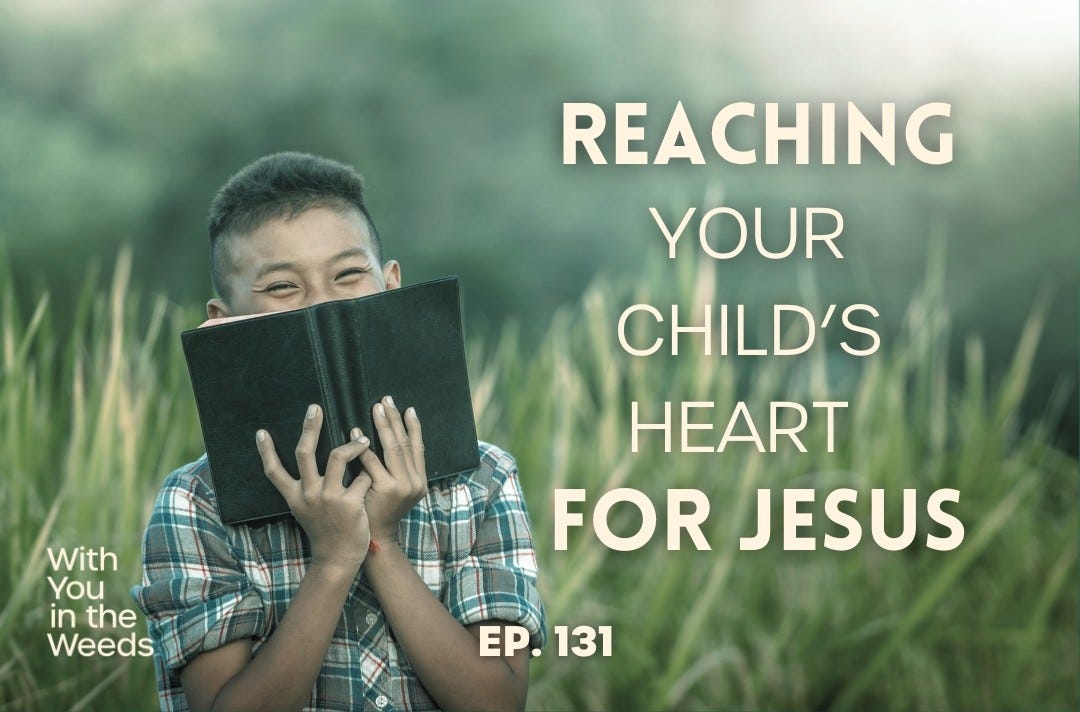Reaching Your Child's Heart for Jesus
What do they need from you?
Do you worry if your child will love and follow Jesus? Do you sometimes feel like they are being shaped more by the culture than by their faith?
It turns out that reaching a child's heart for Jesus involves more than just teaching; it's about modeling a loving, faith-filled life and sharing the gospel message of grace.
In this helpful episode of our ongoing series, Parenting in the Weeds, John and Austin offer encouragement, hope, and practical tips on how to reach your child’s heart:
4 developmental ‘pillars’ to establish in your child’s heart
How to help your child grow spiritually
The role of experiential learning
How to actually reach your children for the Lord
What to do if your child isn’t interested in learning about Jesus
Highlights from the Episode
While God has chosen you as a significant means of working in your child’s heart, ultimately it’s the Holy Spirit that brings your child to a place of loving and following Jesus. As one person put it: “Jesus is the great evangelist. He doesn’t need you and me to spread his gospel, but he invites us to be the means by which the gospel is spread.”
Our emphasis in this episode is going to be on things that you as a parent can do to turn your kids towards Jesus. But you’ll do so knowing that Jesus is ultimately the one who will work in and through your efforts.
You probably don’t need convincing that you’re not a perfect parent. But you may need to hear that it’s okay that you’re not a perfect parent. When you fail, you can rely on God’s grace to help you get back up and try again.
God’s grace in your life has the unexpected but tangible effect of enabling your brokenness, fallenness, and failures to draw you closer to your kids rather than further apart. All of the imperfections in your life provide opportunities for connection with your family.
The Four Basic Developmental Pillars
Not only do these pillars produce confident, secure kids, they are integral to spiritual growth and knowing Jesus. Essentially, you are writing software into your child’s brain that will later be the very places that will help them open up to God and that will enable them to grow in their relationship with him. This gives them what the Bible calls ‘ears to hear’ his voice throughout their lives.
We use the acronym “ABBA” to remember them:
A – Attachment. Safe, Seen, Soothed and Secure. If you are these things for your kid, guess what will happen when they get older and hear a sermon about God’s comfort, his understanding, and his promises to provide? They will have a reference point because of how you’ve parented them.
B – Boundaries. This is another word for limits. Kids need to know that they can’t do everything they want because it’s not good for them. When you step in and provide loving limits as a parent, your kid will later understand that God saying ‘no’ is his protection and goodness.
B – Bad stuff. If your child feels ashamed or has done something wrong, don’t shame them. Instead, help them understand redemption. Let them know that you’ve made mistakes too, and that you still love them unconditionally. When they feel like God is displeased or disappointed, they’ll have a category for God forgiving them and offering hope instead of shame.
A - Authority. When you help your child learn that submitting to your authority is good and exercising their own authority can bring good things into their lives, they will have a category for goodness that comes from being humble before God.
Teaching Your Child Through Concepts
Wondering what important spiritual concepts you should be sharing with your child? Tell them the story of Jesus – his birth, his teachings, his death and resurrection. These discussions may naturally lead to the idea of the Trinity: Father, Son, and Holy Spirit. Talk to them about the Bible – the idea that it’s God’s word, written for us, and that it includes stories, wisdom, miracles, and history about God’s plan for his people.
Read Bible storybooks to your child, make sure they have an age-appropriate Bible (you’ll find recommendations at the end), and work on Bible memory verses together. They’ll appreciate the quality time with you, and you will be demonstrating the importance of knowing and understanding biblical concepts.
Teaching Your Child Through Experience
One of the reasons that kids walk away from the faith when they’re older is because they’ve grown up in settings where they hear a lot of talk and teaching about God, but what they experienced in their relationships growing up was not the character of God! They will learn concepts through reading, listening, and being taught, but they will get a sense of what God is like from relationships.
When you’re cuddling your little one before bedtime, even though you don’t know it, you are teaching them about God – specifically his love, his presence, and his tenderness. When you manage your emotions as you discipline your children, you’re not just parenting well, you’re modeling for them how God disciplines us.
Christian parenting showcases the reality of your brokenness and God’s forgiveness and acceptance of you. The best way to teach a child about grace is by demonstrating that you need grace. The most beautiful way to show God’s heart to your kids is through your own repentant heart. When someone teaches them about God and his mercy later on in their lives, they have a reference point.
Christian parenting showcases the reality of your brokenness and God’s forgiveness and acceptance of you.
Reach Your Children for the Lord
Take the time to tell stories and answer questions. Translate lofty theological concepts in the Bible into stories and words your kids can relate to and understand. Little kids think in concrete terms.
Teach them to pray by modeling it. When you pray, pray like you’re really talking to someone - because you are. Don’t use a prayer voice. Let them hear you stumble in your prayers and not use big theological words. Think of prayer as conversation with God and talk to him in a familiar, intimate way.
Emphasize organic spiritual conversations. While it can be tempting to “preach” to your kids, often the most meaningful and impactful conversations take place around the breakfast table, in the car, or while just hanging out. Be ready to answer questions as they come up – and if you don’t know the answer, make it a project to find out together.
Incorporate church experiences into your child’s life. You won’t want to offload all of your spiritual responsibilities onto the church. But it is important to have other people and influences in your kids’ lives, including small groups, Sunday school, church camp, and programs like Awana.
Sometimes kids go through a stage where they are not interested in spiritual things – or at least not interested in hearing from their parents about it. When this happens, remember that Jesus is working in your child’s heart even though it’s hard to see. God works through relationships, but he also works apart from relationships.
Sensing that your child is spiritually distant? Share from the heart – don’t preach. Pray for opportunities to talk about spiritual topics, and be vulnerable in sharing your own doubts and struggles with them. Read great novels to them like The Pilgrim’s Progress or The Chronicles of Narnia. Provide them with age-appropriate books that have wholesome spiritual content. Play Christian music in your car and home.
Live a Life of Service and Love
You can speak content to your kids about God through stories, devotions, prayers, and church involvement. But you give the greatest spiritual education to your kids through your life as you reflect God’s character and demonstrate your own need for his mercy and grace.
Along with teaching and modeling, keeping the lines of communication open between you and your child will help them feel comfortable coming to you with questions, doubts, and fears. Affirming their desire to “make their faith their own” will reap dividends for years to come.
Recommended Resources
Books:
Setting Parents Free by Dr. John L. Cox
Come Back, Barbara - A Father’s Pursuit of a Prodigal Daughter by C. John Miller
Children’s Bibles:
Elementary: The Jesus Storybook Bible & The Biggest Story Bible
Elementary/Middle School: NIV Kids’ Visual Study Bible
High School: NIV Teen Study Bible
Bible Memory:
Awesome Bible Verses Every Child Should Know by Rebecca Lutzer
Bible Verses for Little Ones by Rebecca Lutzer




